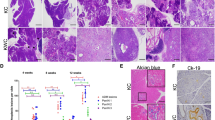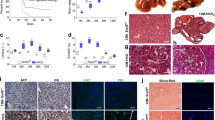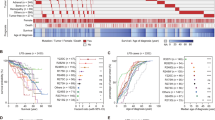Abstract
Germline mutations in the LKB1 gene are responsible for Peutz–Jeghers syndrome (PJS), which is characterized by gastrointestinal hamartomas and increasing risk of cancer. Mice with Lkb1+/− mutation develop gastric hamartomas after >20 weeks of age, and hepatocellular adenomas and carcinomas >30 weeks. It has been reported that, in PJS patients, carcinomas progressed from hamartomas contain p53 mutations, and that LKB1 regulates p53-dependent apoptosis. To investigate the roles of LKB1 and p53 mutations in tumorigenesis, we constructed compound mutant mice of Lkb1 and p53 genes. In the Lkb1+/−p53−/− mice, formation of gastric hamartomas and hepatic tumors was accelerated. However, histopathology of hamartomas was similar between Lkb1+/−p53−/− and Lkb1+/− mice, and Lkb1 genotype remained heterozygous, suggesting that the p53 mutation affected hamartoma initiation. Contrary to the heterozygous hamartomas in the stomach and duodenum, the hepatic adenomas in Lkb1+/−p53−/− mice showed loss of Lkb1 heterozygosity (LOH), suggesting that lack of p53 stimulated Lkb1 LOH and tumor initiation in the liver. Taken together, these results indicate that lack of p53 causes earlier onsets of gastric hamartomas and hepatic tumors in Lkb1+/−p53−/− mice.
This is a preview of subscription content, access via your institution
Access options
Subscribe to this journal
Receive 50 print issues and online access
$259.00 per year
only $5.18 per issue
Buy this article
- Purchase on Springer Link
- Instant access to full article PDF
Prices may be subject to local taxes which are calculated during checkout


Similar content being viewed by others
References
Baas AF, Kuipers J, van der Wel NN, Batlle E, Koerten HK, Peters PJ et al. (2004). Cell 116: 457–466.
Bronner MP . (2003). Mod Pathol 16: 359–365.
Crowe SE . (2005). Curr Opin Gastroenterol 21: 32–38.
Donehower LA . (1996). Semin Cancer Biol 7: 269–278.
Giardiello FM, Welsh SB, Hamilton SR, Offerhaus GJ, Gittelsohn AM, Booker SV et al. (1987). N Engl J Med 316: 1511–1514.
Gruber SB, Entius MM, Petersen GM, Laken SJ, Longo PA, Boyer R et al. (1998). Cancer Res 58: 5267–5270.
Hawley SA, Boudeau J, Reid JL, Mustard KJ, Udd L, Mäkelä TP et al. (2003). J Biol 2: 28.
Hemminki A, Markie D, Tomlinson I, Avizienyte E, Roth S, Loukola A et al. (1998). Nature 391: 184–187.
Jenne DE, Reimann H, Nezu J, Friedel W, Loff S, Jeschke R et al. (1998). Nat Genet 18: 38–43.
Karuman P, Gozani O, Odze RD, Zhou XC, Zhu H, Shaw R et al. (2001). Mol Cell 7: 1307–1319.
Levine AJ . (1997). Cell 88: 323–331.
Livingstone LR, White A, Sprouse J, Livanos E, Jacks T, Tlsty TD . (1992). Cell 70: 923–935.
Miyaki M, Iijima T, Hosono K, Ishii R, Yasuno M, Mori T et al. (2000). Cancer Res 60: 6311–6313.
Miyoshi H, Nakau M, Ishikawa T, Seldin MF, Oshima M, Taketo MM . (2002). Cancer Res 62: 2261–2266.
Mutoh H, Sakurai S, Satoh K, Tamada K, Kita H, Osawa H et al. (2004). Cancer Res 64: 7740–7747.
Nakau M, Miyoshi H, Seldin MF, Imamura M, Oshima M, Taketo MM . (2002). Cancer Res 62: 4549–4553.
Papageorgiou T, Stratakis CA . (2002). Int J Gynecol Cancer 12: 337–347.
Seno H, Oshima M, Taniguchi M, Usami K, Ishikawa T, Chiba T et al. (2002). Int J Oncol 21: 769–774.
Spigelman AD, Murday V, Phillips RK . (1989). Gut 30: 1588–1590.
Takahashi M, Sakayori M, Takahashi S, Kato T, Kaji M, Kawahara M et al. (2004). J Gastroenterol 39: 1210–1214.
Tiainen M, Ylikorkala A, Mäkelä TP . (1999). Proc Natl Acad Sci USA 96: 9248–9251.
Williams BO, Remington L, Albert DM, Mukai S, Bronson RT, Jacks T . (1994). Nat Genet 7: 480–484.
Woods A, Johnstone SR, Dickerson K, Leiper FC, Fryer LG, Neumann D et al. (2003). Curr Biol 13: 2004–2008.
Acknowledgements
We thank Drs Masahiro Aoki and Koji Aoki for fruitful discussions.
Author information
Authors and Affiliations
Corresponding author
Rights and permissions
About this article
Cite this article
Takeda, H., Miyoshi, H., Kojima, Y. et al. Accelerated onsets of gastric hamartomas and hepatic adenomas/carcinomas in Lkb1+/−p53−/− compound mutant mice. Oncogene 25, 1816–1820 (2006). https://doi.org/10.1038/sj.onc.1209207
Received:
Revised:
Accepted:
Published:
Issue Date:
DOI: https://doi.org/10.1038/sj.onc.1209207
Keywords
This article is cited by
-
LKB1 loss by alteration of the NKX2-1/p53 pathway promotes tumor malignancy and predicts poor survival and relapse in lung adenocarcinomas
Oncogene (2014)
-
The LKB1–AMPK pathway: metabolism and growth control in tumour suppression
Nature Reviews Cancer (2009)
-
LKB1; linking cell structure and tumor suppression
Oncogene (2008)



